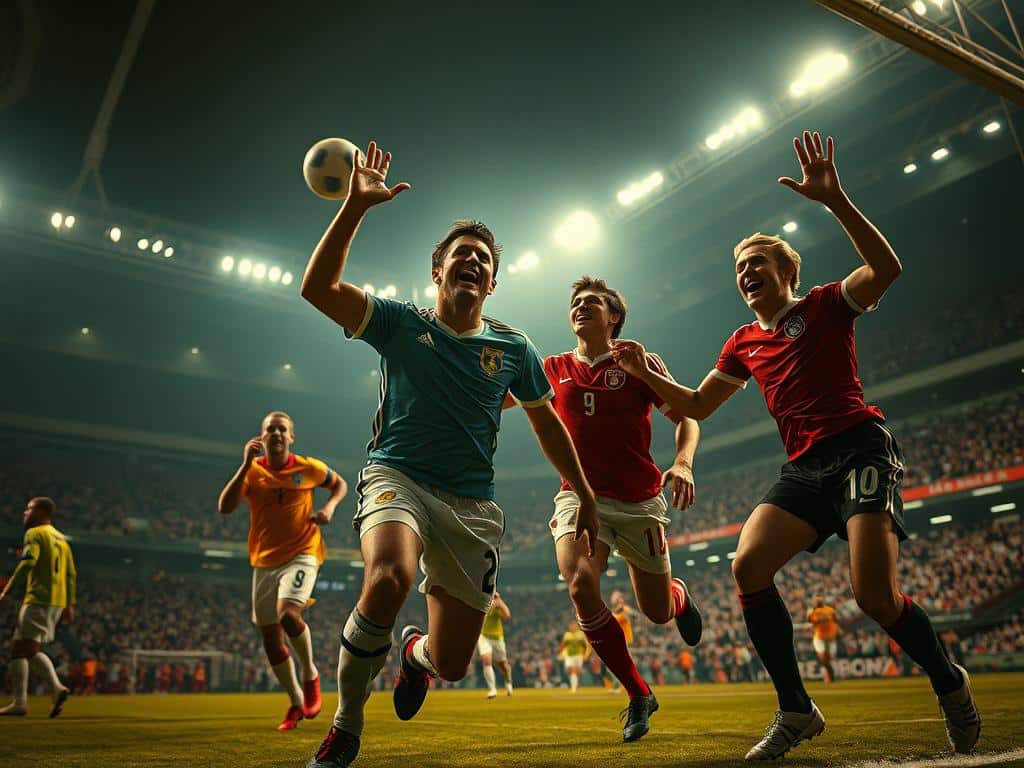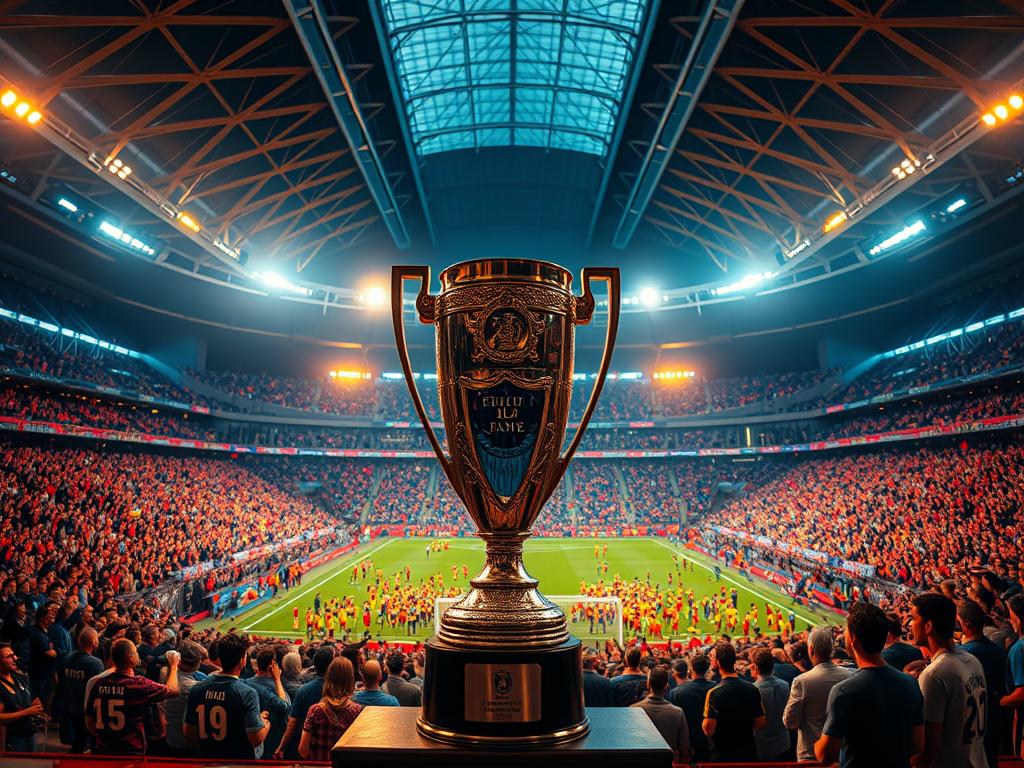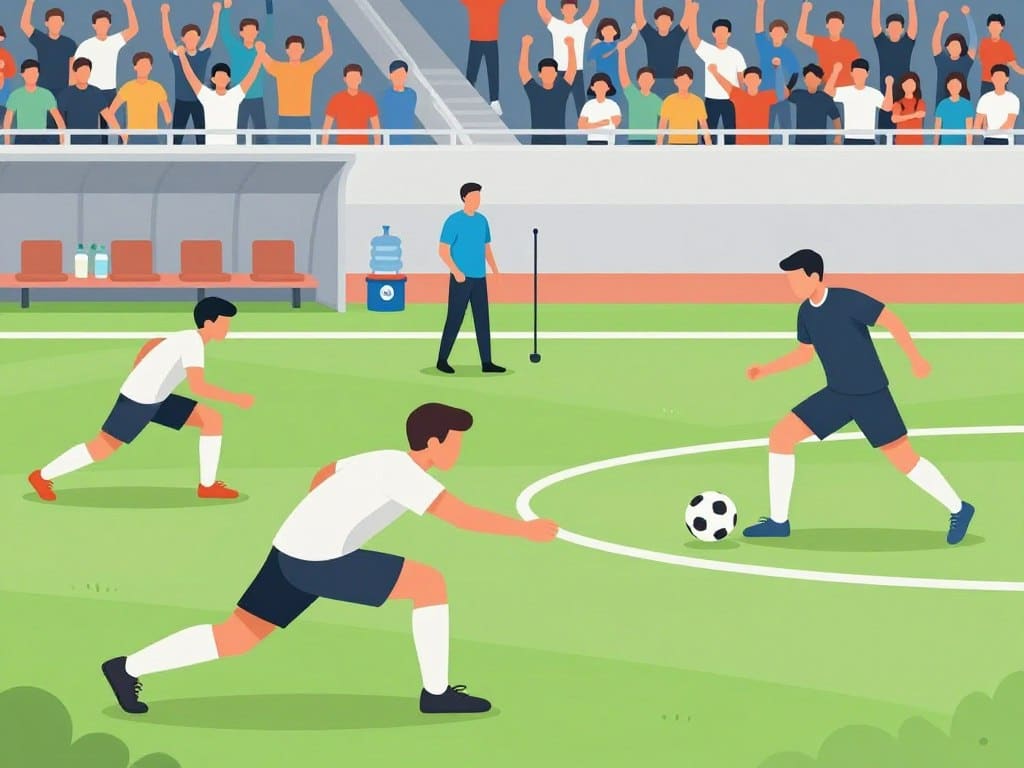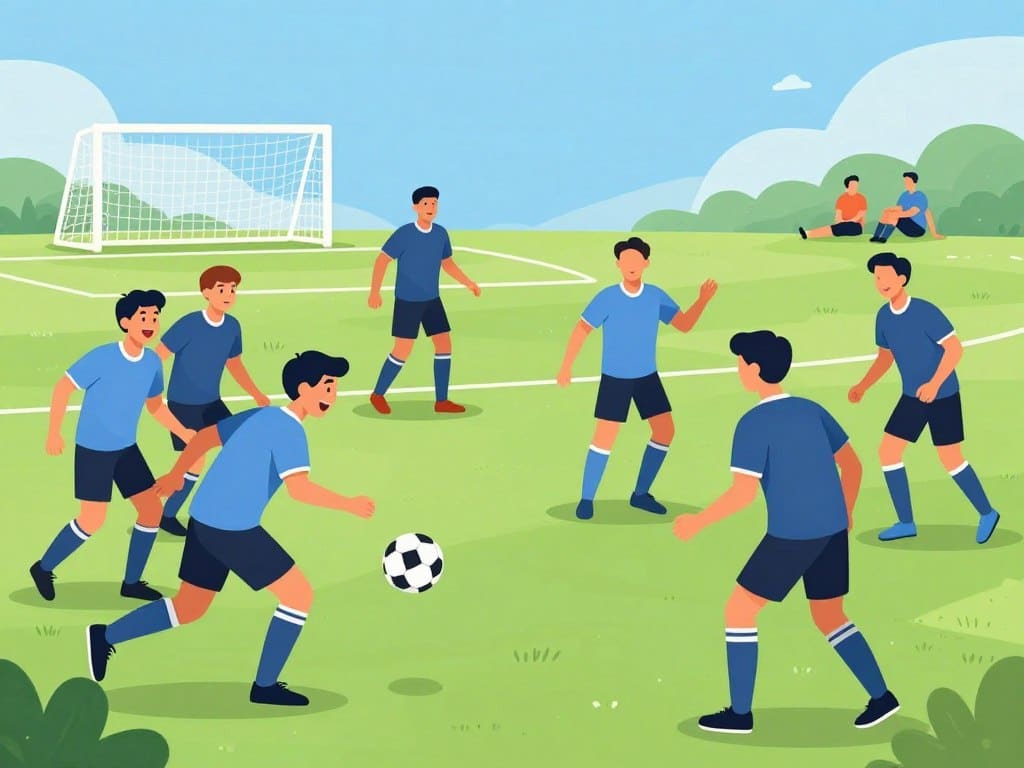The FIFA World Cup has seen over 2,700 goals scored by more than 1,300 players. Yet, only a select few have left an unforgettable mark. What makes these legends stand out? Let’s dive into the stories behind the most prolific strikers in tournament history.
From Miroslav Klose’s record-breaking 16 goals to Just Fontaine’s incredible 13 in a single edition, the competition has produced unforgettable moments. These players didn’t just score—they defined eras and inspired generations.
Ready to explore the greatest achievements in World Cup football? We’ll break down the stats, milestones, and the sheer brilliance of the game’s finest talents.
Introduction: The Art of Goal-Scoring in the World Cup
Nothing electrifies fans like a perfectly timed strike in the World Cup. These moments turn athletes into legends and unite nations. Every goal carries the weight of history—and the promise of immortality.
The Significance of Goals in World Cup History
A single goal can redefine a player’s career. Think of Diego Maradona’s “Hand of God” or Geoff Hurst’s 1966 hat-trick. These aren’t just stats—they’re stories etched into football folklore.
The tournament’s drama hinges on scoring. Tactics evolve, but the thrill remains. Defensive strategies rise and fall, yet sharpshooters always steal the spotlight.
Overview of the Top Scorers’ Achievements
Since 1982, the Golden Boot has crowned the tournament’s best scorer. Tie-breakers like assists decide close races—penalty shootouts don’t count. Here’s why these feats matter:
- Instant Glory: Underdogs become heroes overnight.
- Tactical Legacy: Goals force teams to adapt.
- Unforgettable Drama: Golden Boot races keep fans on edge.
From Just Fontaine’s 1958 rampage to modern icons like Mbappé, the sports world remembers those who deliver when it counts.
The Unmatched Record of Miroslav Klose: 16 Goals
Few players have dominated the tournament like Miroslav Klose. His 16-goal record wasn’t built on flair—it was crafted through relentless precision. Klose proved that greatness isn’t about moments; it’s about longevity.
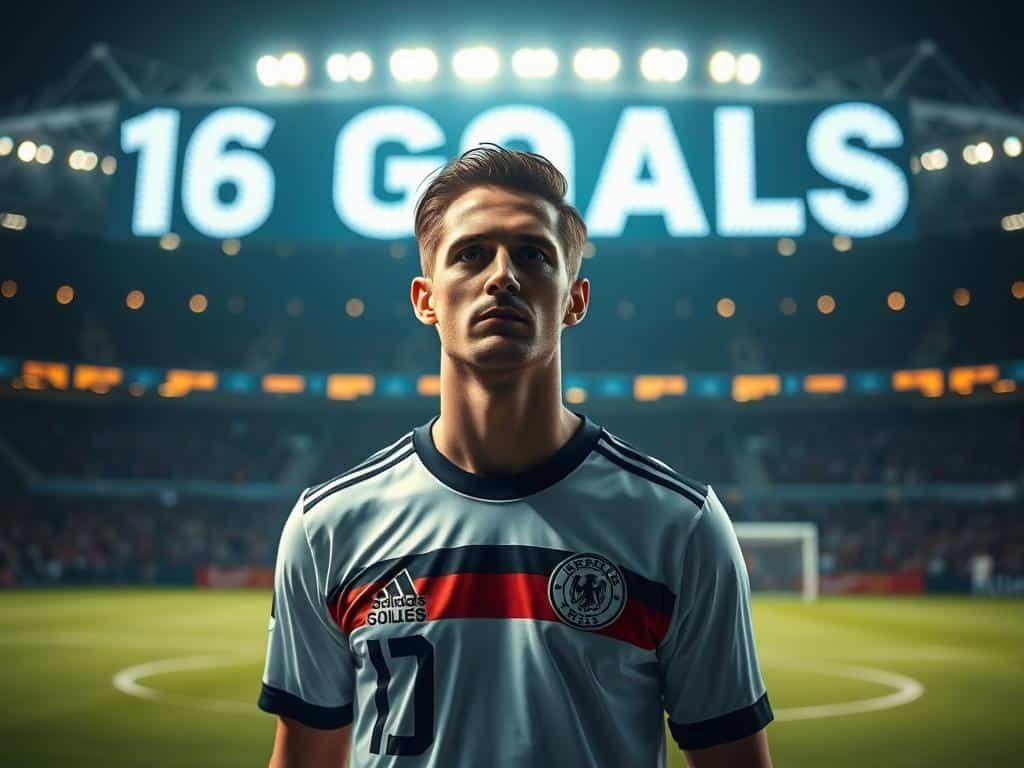
Klose’s Consistency Across Four Tournaments
From 2002 to 2014, he scored in every edition. No other player matched this feat. Klose’s secret? Delivering in group stages and knockouts.
His team relied on him. Germany’s system amplified his strengths, but Klose’s positioning was unmatched. He turned simple taps into historic goals.
The Historic Semi-Final Goal Against Brazil
In 2014, he broke Ronaldo’s record with a classic Klose strike. A rebound, a tap-in—routine for him, legendary for fans. That goal sealed his place in history.
The match was a blur, but Klose’s calm stood out. At 36, he outworked defenders half his age. His country celebrated like never before.
His Golden Boot Win in 2006
Klose claimed the Golden Boot with 5 goals on home soil. Each one showcased his aerial prowess and timing. He wasn’t just a scorer—he was a strategist.
By 2014, he lifted the trophy, crowning his 24-match journey. Klose’s legacy? A record built on grit, not glamour.
Ronaldo Nazário: Brazil’s Prolific Striker with 15 Goals
When you think of Brazilian football magic, one name stands above the rest—Ronaldo Nazário. His 15 strikes across three tournaments blend raw talent with unforgettable drama. Few players have defined their country’s legacy like “O Fenômeno.”
His 1998 Heartbreak and 2002 Redemption
The 1998 World Cup final remains shrouded in mystery. Ronaldo scored 4 goals leading Brazil there, then collapsed hours before kickoff. Rumors swirled—was it a seizure? Stress? His team lost 3-0, but his resolve grew stronger.
Four years later, he silenced doubters. After two knee surgeries, critics wrote him off. Yet in 2002, he delivered 8 goals in 7 games, including a brace in the final. That iconic haircut celebration? Pure joy.
The 2002 Golden Boot and World Cup Triumph
Ronaldo didn’t just win the Golden Boot—he lifted the trophy too. No player had done both in the same year. His bicycle kick against Turkey? A masterpiece. Every goal screamed redemption.
- From benchwarmer to legend: At 17, he watched from the sidelines in 1994. By 2002, he carried Brazil.
- The 1998 mystery: Doctors later confirmed a convulsive fit—but his courage to play inspired millions.
- 2002’s magic: 8 goals, including the final decider against Germany, sealed his immortality.
Ronaldo’s story isn’t just about goals. It’s about resilience—and proving greatness isn’t linear.
Gerd Müller: 14 Goals in Just 13 Matches
Efficiency defined—that’s Gerd Müller’s legacy in football history. Nicknamed “Der Bomber,” he scored 14 times in only 13 appearances. No striker has matched his ruthless precision.
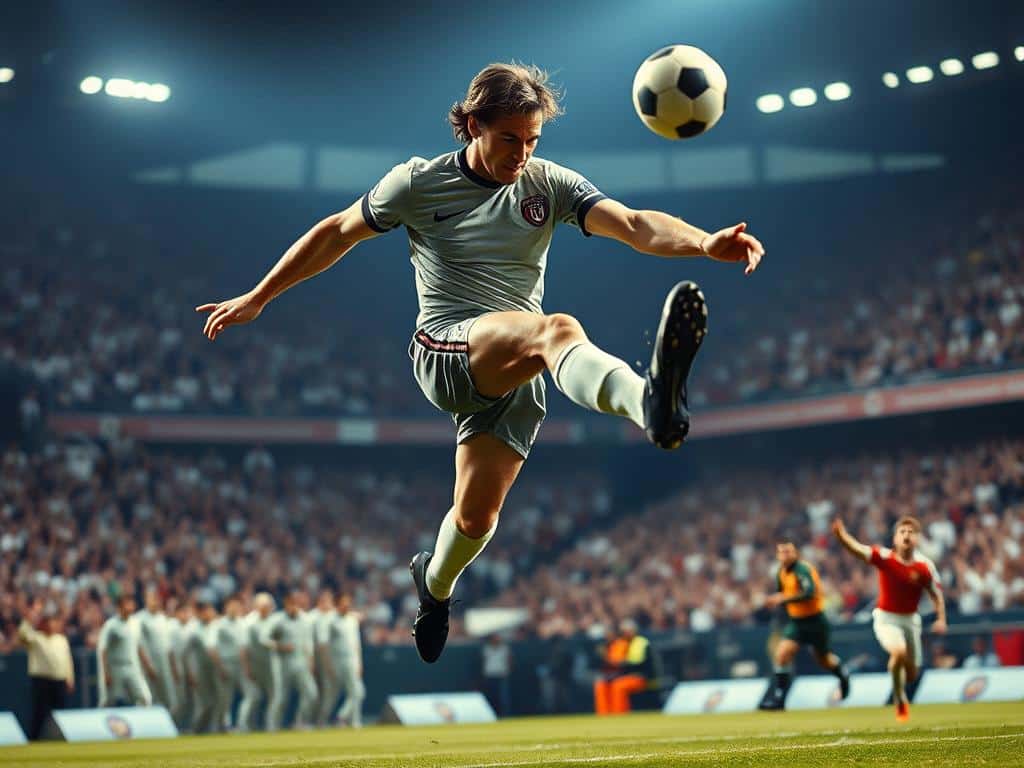
His 1970 Golden Boot Performance
At the 1970 tournaments, Müller netted 10 goals, including back-to-back hat tricks. The penalty box was his office. No wasted steps. No flashy tricks—just clinical finishes.
Germany fell in the semis, but Müller’s stats stunned everyone:
- Goal every 84 minutes—the best rate ever.
- All goals from inside the box.
- Modern strikers still study his movement.
The 1974 World Cup-Winning Campaign
Four years later, Müller had a quiet run—until the final. Against the Netherlands, he struck the winner. One touch. One goal. One trophy.
His team celebrated, but Müller’s impact went deeper. He proved that efficiency beats flair. In just two tournaments, he cemented himself as the most lethal scorer ever.
Just Fontaine’s Unbreakable 1958 Record: 13 Goals in One Tournament
Some records seem destined to last forever—Just Fontaine’s 1958 feat is one of them. In just six games, the French striker netted 13 times, a record that still stands today. No player has come close since.
Scoring in Every Match He Played
Fontaine didn’t just score—he dominated. From the group stage to the third-place match, he found the net in all six games. His four-goal explosion against West Germany remains a World Cup highlight.
What made him unstoppable?
- Hat-trick hero: He demolished Paraguay and West Germany with back-to-back hat tricks.
- Underrated speed: Defenders couldn’t match his quick bursts into the box.
- Ice-cold finishes: 10 of his 13 goals came from inside the penalty area.
Why His Career Ended Prematurely
At 28, Fontaine’s soccer journey ended abruptly. Multiple leg fractures forced him to retire, robbing fans of more magic. He never played another World Cup match.
His legacy? The ultimate “one-hit wonder” in history—but what a hit it was. Even Pelé’s 1958 brilliance couldn’t overshadow Fontaine’s run.
Could Mbappé break his record? Maybe. But for now, Fontaine’s 13-goal masterpiece remains untouched.
Modern Legends: Messi and Mbappé Join the Elite
The beautiful game keeps evolving, and so do its heroes. Two names now dominate the conversation—Lionel Messi and Kylian Mbappé. Their performances in Qatar 2022 redefined what it means to be a modern football icon.
Lionel Messi’s Rise to 13 Goals
For years, critics said Messi couldn’t deliver on the biggest stage. Then came Qatar 2022. With 7 goals, including a brace in the final, he silenced doubters forever.
His journey wasn’t just about stats. It was about leadership. Messi carried Argentina through tense moments, scoring in every knockout match. That penalty against France? Pure nerves of steel.
Kylian Mbappé’s Rapid Ascent
At just 23, Mbappé already has 12 World Cup goals. His 2022 Golden Boot win (8 goals) included a hat-trick in the final—something no one had done since 1966.
From his 2018 debut as a teen star to becoming France’s talisman, Mbappé’s speed and finishing are unmatched. Defenders fear him. Fans adore him.
- Epic 2022 Final: Messi’s two goals vs. Mbappé’s three—a duel for the ages.
- Future Records: Both are active. Could either surpass Klose’s 16?
- Rivalry Defined: Their clash symbolizes modern football’s brilliance.
One thing’s certain: Messi and Mbappé aren’t just players—they’re legends in the making.
Golden Boot Winners and the Evolution of the Award
From assists to minutes played, the Golden Boot tie-breakers reveal football’s hidden battles. This award isn’t just handed to the highest scorer—it’s earned through razor-thin margins and unforgettable performances.
Rules for Tie-Breakers in the Golden Boot Race
Since 1994, FIFA has used a strict system to decide tied players. Goals alone aren’t enough. Here’s how it works:
- Assists first: More passes leading to goals? You win.
- Minutes played: Fewer minutes on the pitch gives you the edge.
- No penalties: Shootout goals don’t count—only open-play brilliance.
In 2010, Thomas Müller won thanks to assists. Fans needed calculators, but the rulebook was clear.
Notable Golden Boot Performances Beyond the Top Scorers
Some tournament heroes flew under the radar. Take Oleg Salenko. In 1994, the Russian sub scored 5 goals in one match against Cameroon—a record still standing.
Then there’s Sándor Kocsis. In 1954, he netted 11 times in just 5 matches. No fan today remembers him, but his stats are legendary.
Why do these stories matter? They prove the Golden Boot isn’t just for superstars. Sometimes, it’s the underdogs who write history.
The Legacy of World Cup Goal-Scoring Greats
Legends aren’t made in club matches—they’re forged here. A single strike in this tournament can define a career and unite a nation. Think of Klose’s quiet consistency or Ronaldo’s explosive redemption. These aren’t just stats; they’re stories.
Why do these goals matter more? The pressure is unmatched. Players carry hopes of millions, and chances are rare. Only six have hit double-digit record totals across tournaments. Germany, Brazil, and France dominate the list—proof of their football DNA.
Who’s next? Mbappé’s 12 goals by age 24 hint at history in the making. But breaking these marks takes more than skill. It demands nerve, timing, and a touch of magic.
That’s the beauty of this sports stage. Every goal etches a name into legend—one unforgettable kick at a time.

